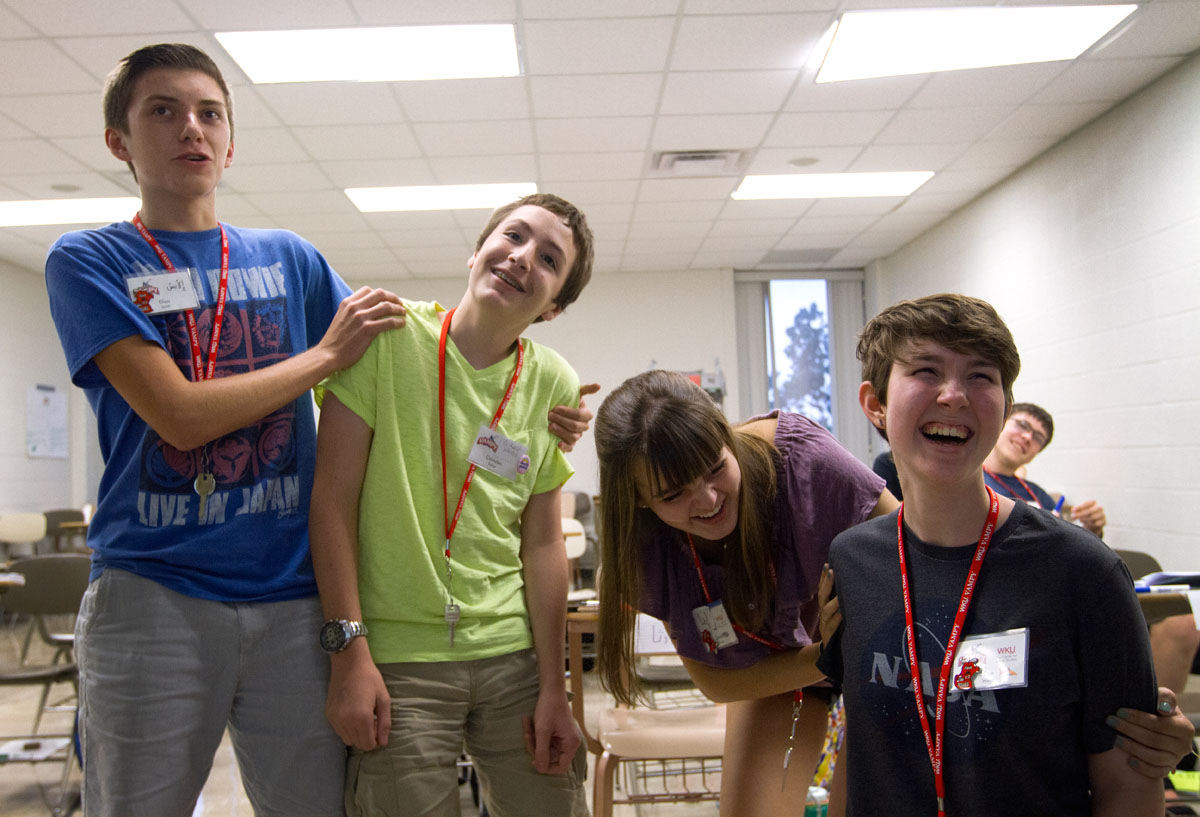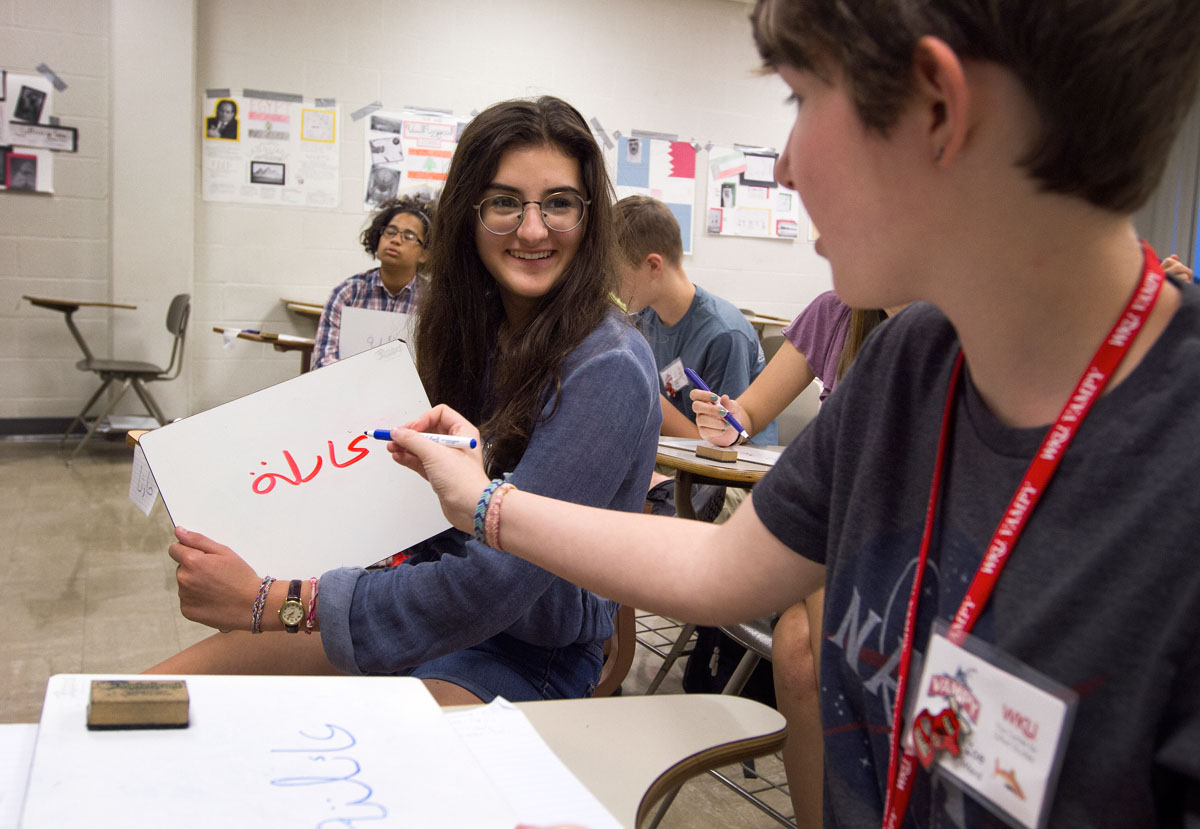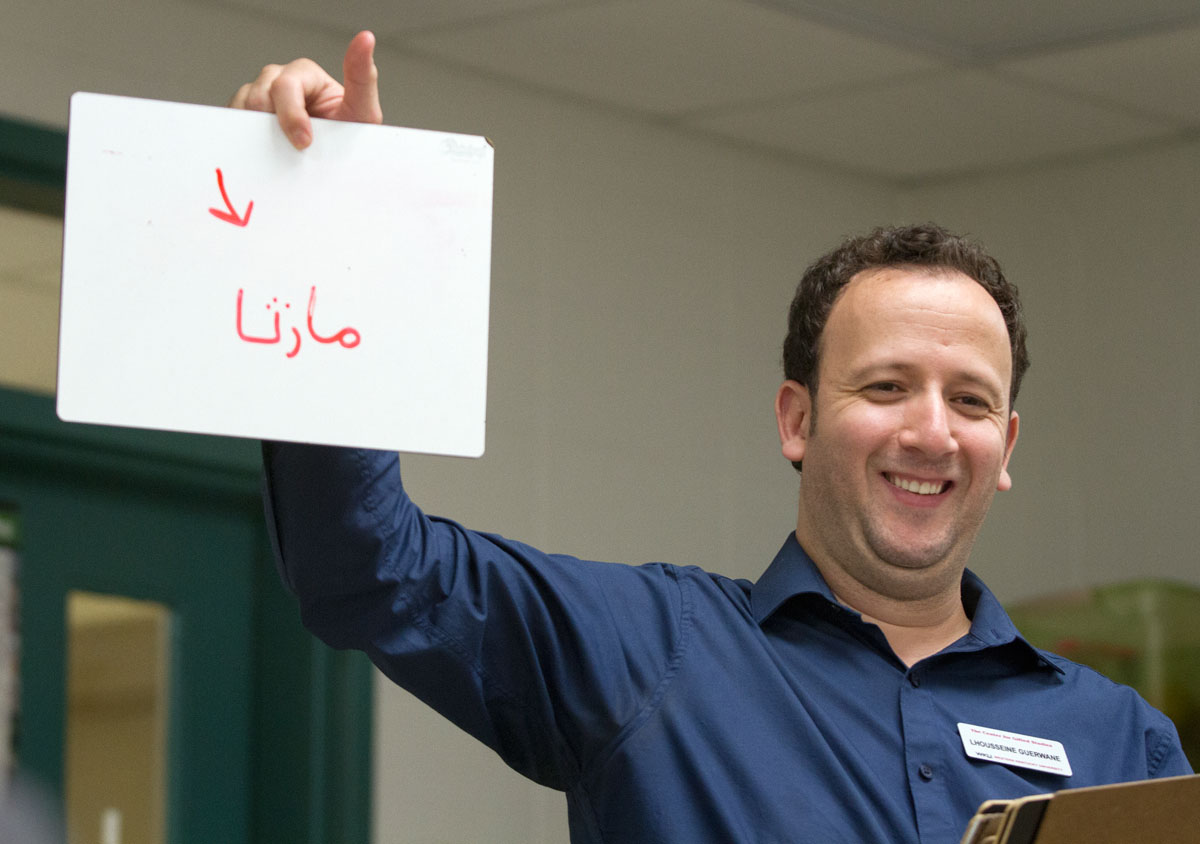By Erika Solberg
It’s the second Wednesday of the VAMPY Arabic course, and instructor Lhouie Guerwane is introducing his students to the Arabic cartoon Sidibad. As he shows them pictures of the main characters, he uses gestures, repetition, and an expressive voice to help them comprehend what he is saying in a language they could not understand ten days before.
Those ten days have been busy: the classroom walls are covered in evidence of the students’ work, including posters on Arabic countries they have researched and presented on, calligraphy projects, and family trees. Their progress is also clear from the spontaneous singing of Arabic songs that keeps breaking out.
The Arabic course is a combination of culture, language, and camaraderie, expertly orchestrated by Lhouie, an Arabic instructor at WKU. This year is his fifth teaching at VAMPY, and he is supported by teaching assistant Savannah Gillam, a WKU senior majoring in biology and Arabic. In addition, the class is enhanced by a 2017 grant from Qatar Foundation International (QFI) that is making it possible for up to ten students to study Arabic at VAMPY through a scholarship that covers their costs. QFI, a member of the Qatar Foundation which is funded by the Qatari government, sponsors programs that promote Arabic education and culture in the United States.

Among the scholarship recipients is Ismaila Ceesay of Berea. He is impressed by how much ground the course has covered: “I like that we’ve gone at a good pace — we’re already writing and doing basic conversation. I was surprised by how much we’ve done in a week.”
Another scholarship recipient, Jacob Conway of Georgetown, is looking forward to using his Arabic: “We’re going to Nashville to the Islamic Center, and also we’re going to an Arabic restaurant to order and talk in Arabic.” For him what’s most enjoyable about the course is “getting to absorb another language, and being exposed to a different culture.”
One way the students are learning about Arabic culture is through Friday Skype sessions with a group of teenagers at the U.S. Embassy in Tunisia. Later during the course the VAMPY students will explain American holidays like Thanksgiving and the Fourth of July to their Tunisian counterparts, but during their first session the Tunisians explained Ramadan and Eid to the Americans.
Afterwards, Lhouie answered students’ questions about Arabic culture. The curiosity of the students, evident in the range of their questions and in their focus as they listened to his answers, is one of Lhouie’s favorite parts about teaching a VAMPY class: “They have lots of questions — all kinds of questions — and that’s how they learn, much more than going over A, B, C, D.”
This question and answer session covered a lot of material, including how the calendar for Ramadan works, what fasting is like and what exceptions there are for it, why minarets are built so high, the purpose of washing feet before prayer, and whether Lhouie prays in Arabic or English. Lhouie, a native of Morocco, also explained why Marrakech is such a popular tourist city: “Because it’s the best — I lived there!” he joked. “Also, it’s very old, and was the capital of the country many times. It has a lot of monuments and parks, and an open-air square with 24-hour entertainment.”

When asked how Islam views other religions, Lhouie discussed how multi-cultural Morocco is: “We work together and trade together — religion is on the side. We recognize each other’s right to be different, and part of Muslim worship is to improve self and society.”
This fellowship is apparent in how Lhouie teaches the Arabic language to his students, tapping into their enthusiasm and making the class truly about learning together. For instance, when they were working on vowels, he lead the students in a sing-along to a video on short vowel sounds. First the students sang together, repeating the sounds with confidence. Next they sang row by row, and then finished as a group once more. The students clapped and raised their arms in victory, recognizing their accomplishment.
Arabic student Kamrin Green, a scholarship recipient from Bowling Green, says one thing that has challenged her in the course is pronunciation: “The Arabic letters have very similar sounds, so sometimes it’s really hard to differentiate between which ‘ha’ is being used. It’s a lot different than the English.” Through exercises like the vowel song, however, she and her classmates are able to immerse themselves in the sounds and advance quickly.
Another class activity involved drawing a caricature of a famous person and talking about it in front of the class to see who could guess the subject of the drawing. While the students worked, Lhouie put on a video of singers performing on X Factor Arabia and then one of his favorite singer, Cheb Khaled.

As each student stood up before the class, he or she said the traditional Arabic greeting, “As-salamu alaykum,” and the class replied, “Wa alaykumu as-salam,” which translates to “peace be upon you” and “upon you be peace.” One student drew a picture of classmate Zoe Ward of Frankfort, and the students shouted “He Zoe!” when they guessed correctly. Later, Emma Poole of Central City stated, “Hu men madina Bikini Bottom” when describing what city her person, SpongeBob SquarePants, is from. The students also assisted each other when necessary, such as when one student forgot how to say the number 12.
For Lhouie, the atmosphere in the class is as positive for him as it is for the students: “I love VAMPY —the students always want more. I always prepare to teach three weeks’ worth of material, but I always teach more because they want to learn.”
